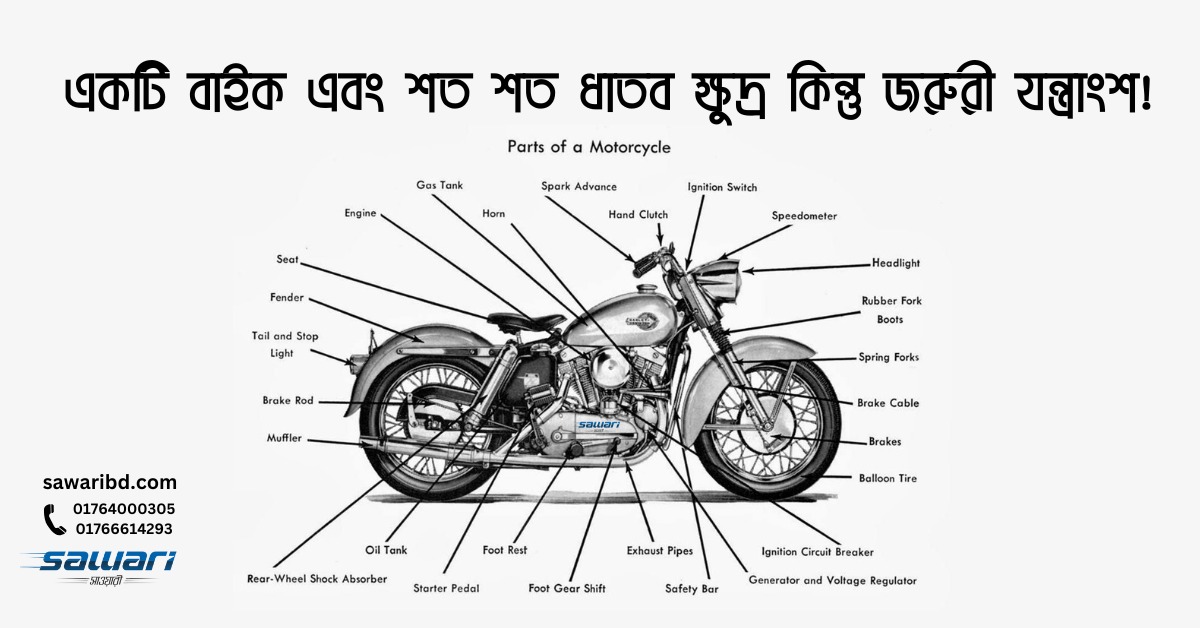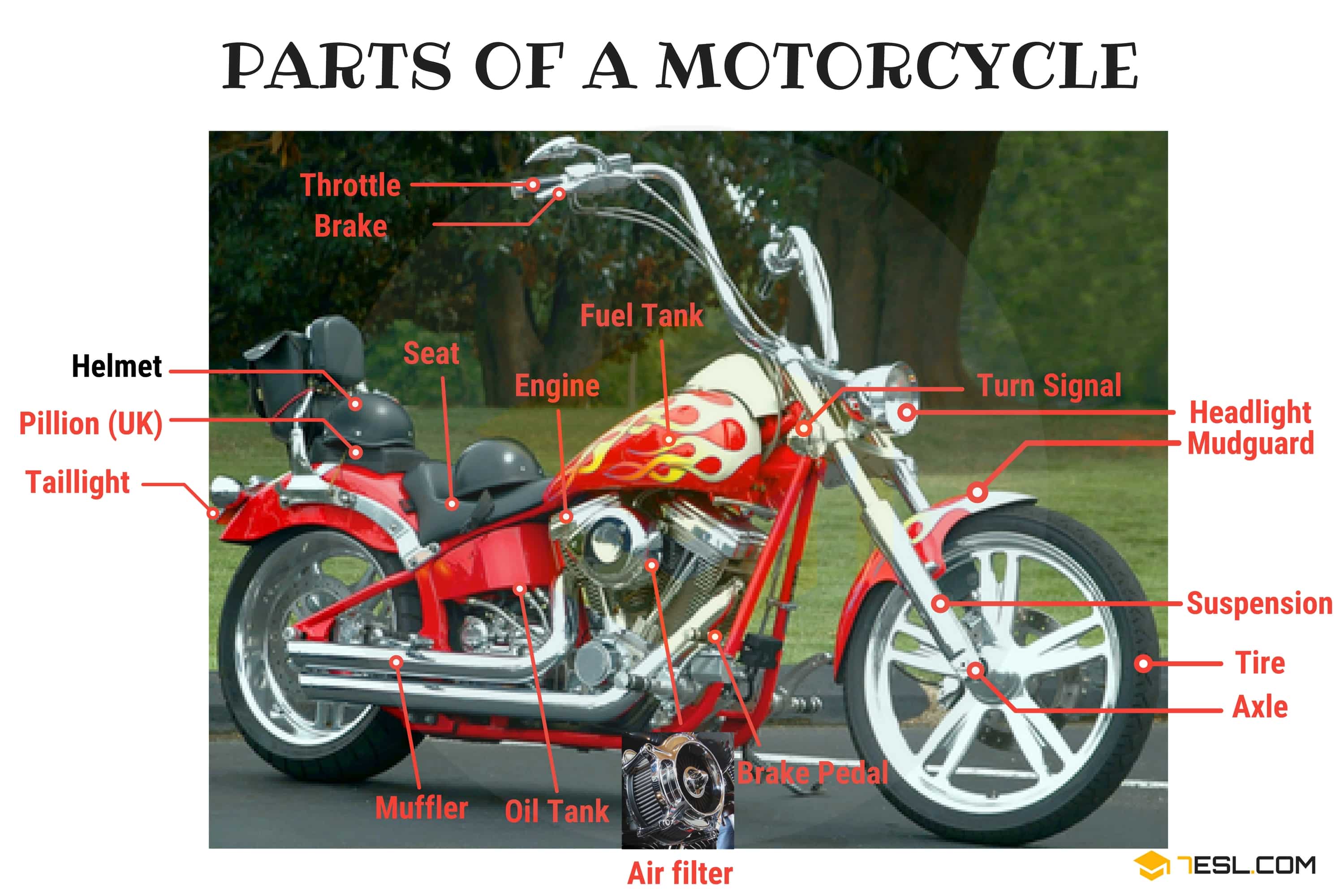What Makes High-Grade Motorcycle Parts Auckland Essential for Daily Commuters
What Makes High-Grade Motorcycle Parts Auckland Essential for Daily Commuters
Blog Article
Discover the Necessary MotorBike Parts You Need for Optimal Efficiency
Understanding the crucial parts of a motorbike is fundamental for attaining peak performance. Each part, from the engine to the braking system, plays a critical function in general performance and safety. Regular upkeep can prevent unexpected failures and improve the riding experience. Nevertheless, lots of motorcyclists neglect the complexities of these systems. Finding just how they function together can bring about a more efficient adventure. What essential elements should every rider prioritize?
The Engine: The Heart of Your Bike
The engine acts as the core part of a motorbike, driving its efficiency and defining its abilities. It is in charge of transforming gas right into power, which powers the bike forward. Different types of engines are utilized, consisting of single-cylinder, V-twin, and inline arrangements, each offering unique qualities suited for different riding functions and styles. The engine size, normally measured in cubic centimeters (cc), considerably affects efficiency, with larger engines generally supplying even more power and torque.Furthermore, the engine's layout and technology, such as fuel injection systems or air-cooling versus liquid-cooling, influence efficiency and integrity. Maintenance is important for peak operation; aspects like routine oil modifications and monitoring ignition system assurance long life. Motorcyclists often think about an engine's responsiveness and smoothness, as these features improve the total riding experience. Eventually, the engine remains a vital element that defines not only the bike's performance yet likewise the biker's link to the maker.
The Transmission: Moving Gears Efficiently
The transmission plays a crucial role in a motorbike's efficiency, particularly in the auto mechanics of gear moving. Understanding just how to change equipments smoothly can enhance the general riding experience, while regular maintenance assurances peak performance. Proper focus to these elements can substantially impact the long life and performance of the motorbike.

Gear Shifting Mechanics
Smooth equipment shifting is essential for suitable motorcycle efficiency, significantly influencing both acceleration and control. The auto mechanics of equipment changing entail the communication in between the clutch, gear bar, and transmission system. When a rider involves the clutch, it disengages the engine from the transmission, enabling a gear adjustment without damaging the parts. A well-timed release of the clutch, integrated with specific movement of the gear bar, helps with a smooth adjustment between equipments. This process assures that the engine runs within its best power band, boosting performance. Motorcycle Spares Christchurch. Additionally, recognizing the equipment proportions and their effect on speed and torque can assist cyclists make educated choices throughout changes, eventually adding to a much more responsive and satisfying riding experience
Upkeep Tips Value
Regular upkeep plays a necessary function in assuring that the transmission system operates effectively, permitting smooth equipment changes. Regularly altering the transmission and inspecting fluid is important, as old liquid can bring about raised friction and wear. In addition, inspecting the clutch for wear warranties peak engagement and disengagement, preventing slippage throughout gear modifications. Lubrication of moving parts is similarly essential to minimize rubbing and improve efficiency. Motorcycle owners must also check for leaks and uncommon sounds, as these can indicate underlying concerns. By sticking to these upkeep ideas, riders can lengthen the life expectancy of their transmission system, assuring that gear shifts continue to be smooth and adding to the overall performance of their motorcycle.
The Braking System: Ensuring Safety on Every Adventure
Braking systems are basic elements that directly influence a motorbike's security and performance. They include different parts, including brake pads, blades, calipers, and hydraulic lines, all interacting to ensure reliable deceleration. The sort of stopping system-- typically either disc or drum-- influences responsiveness and stopping power.Regular maintenance is necessary to support peak performance; worn brake pads can lead to reduced effectiveness and enhanced stopping distances. In addition, the top quality of brake liquid must be kept an eye on, as it can soak up wetness in time, compromising braking efficiency.Riders should also consider the significance of anti-lock braking systems (ABDOMINAL MUSCLE), which stop wheel lockup throughout sudden quits, improving total safety. Correctly operating brakes are not almost quiting; they instill self-confidence in the biker, permitting much safer navigation via numerous surfaces. Eventually, a trustworthy braking system is essential for enjoying every ride with assurance.
The Suspension: Enhancing Comfort and Control
A well-functioning suspension system considerably adds to a motorbike's general efficiency, matching the effectiveness of the braking system. The suspension plays a substantial function in soaking up shocks from irregular surfaces, guaranteeing a smoother ride while preserving tire call with the roadway. This contact is necessary for both stability and control, allowing bikers to browse edges with self-confidence and precision.Different kinds of suspension systems, such as telescopic forks or mono-shocks, supply varying degrees of comfort and handling. Correctly tuned suspension boosts responsiveness, giving the biker with an extra connected feeling to the motorbike. Regular upkeep checks are necessary to establish the suspension elements, including springs and dampers, are operating at their best. An effective shock absorber not only raises the riding experience yet likewise adds to the longevity of other motorcycle components by lessening deterioration. Consequently, buying top quality suspension is essential for any kind of major motorbike lover.
The Tires: Connecting You to the Roadway
Tires play an essential role in a motorcycle's performance, working as the key web click for more link in between the motorcyclist and the road. Understanding the different sorts of tires readily available can substantially affect managing and safety. In addition, routine upkeep is essential to guarantee peak tire efficiency and durability.
Tire Enters Explained
Just how do various tire types influence a motorcycle's efficiency? Tire types play a vital duty in identifying a motorcycle's stability, handling, and grip. Sport tires, developed for high efficiency, deal enhanced grip and responsiveness on paved roadways, making them suitable for racing and aggressive riding. Alternatively, exploring tires focus on longevity and comfort, providing a smoother experience for long-distance traveling. Off-road tires, characterized by their rugged step patterns, master grip on unpaved surface areas, ideal for journey enthusiasts. Additionally, dual-sport tires mix attributes from both off-road and on-road classifications, satisfying functional riding requirements. Eventually, choosing the right tire type is essential for maximizing performance, making certain safety and security, and enhancing the general riding experience.
Upkeep Tips Offered
While riding when driving, keeping perfect tire condition is crucial for safety and security and performance. Frequently inspecting tire pressure is necessary, as under-inflated tires can result in bad handling and raised wear. It is recommended to examine tread depth regularly; worn tires concession grip and security. Furthermore, bikers must search for indications of damage, such as lumps or splits, which can suggest the demand for substitute. Revolving tires periodically ensures also put on, improving longevity. Keeping tires clean from debris and avoiding extreme aesthetics can prolong their life expectancy. Ultimately, preserving proper placement and equilibrium adds to peak performance, lessening stress on other bike elements. Complying with these maintenance suggestions will greatly enhance the general riding experience.
The Gas System: Sustaining Efficiency and Effectiveness
The gas system plays a vital function in taking full advantage of a motorbike's efficiency and efficiency, as it guarantees the optimum delivery of gas to the engine. It consists of several critical elements, consisting of the gas tank, fuel pump, gas filter, and fuel injectors or carburetor. Each part must work properly to ensure a powerful and smooth ride.The gas tank shops gasoline and supplies it to the engine by means of the gas pump, which creates the essential pressure. A gas filter prevents impurities from getting in the engine, while the injectors or carburetor mix fuel with air for combustion.Proper upkeep of the fuel system is critical; a blocked filter or malfunctioning injector can cause decreased efficiency and boosted fuel intake. By confirming that the gas system operates efficiently, bikers can appreciate enhanced throttle action, much better gas economy, and in general enhanced riding experience.
The Electric System: Powering Your Adventure
A reliable electrical system is important for the general capability and safety of a motorbike, as it powers essential components such as the ignition, lighting, and numerous electronic systems. This system consists of the battery, which shops energy, and the alternator, in charge of producing power while the engine runs. The circuitry harness links these elements, making sure trustworthy power distribution.Additionally, merges shield the system from overloads, while relays aid manage high-current tools with low-power signals. A well-kept electrical system improves efficiency by guaranteeing smooth starts and regular procedure of lights and signals, vital for rider visibility and safety.Regular checks of the battery's charge and links are essential for stopping electric failings. Cyclists should also check wiring for damage, making certain all components operate ideally. Ultimately, a durable electric system adds significantly to the total performance and integrity of the motorcycle.
Regularly Asked Questions
Just how Usually Should I Change My Motorbike's Battery?
The regularity of motorbike battery replacement depends on usage and upkeep (Motorcycle Spares Christchurch). Generally, batteries must be replaced every 3 to 5 years. Regular checks can aid determine when a replacement is needed for peak efficiency
What Devices Do I Required for Basic Bike Upkeep?
For basic bike maintenance, one requires crucial tools such as an outlet Read More Here collection, wrenches, screwdrivers, pliers, tire pressure scale, and a torque wrench. These devices assist in reliable maintenance and assure the bike runs successfully and safely.
Just How Can I Enhance My Bike's Aerodynamics?
To enhance motorcycle the rules of aerodynamics, one ought to consider adjusting fairings, using windscreen extensions, maximizing body position, and decreasing general weight. These adjustments aid decrease drag, boosting security and fuel performance during experiences.
What Are the Signs of a Failing Electrical System?
Signs of a falling short electric system consist of dimming lights, trouble starting, uneven tool her response readings, and blown fuses. Motorbike Components NZ. Unusual smells or corrosion around battery terminals may also show underlying problems requiring immediate focus for safety and performance

How Do I Choose the Right Oil for My Bike?
When choosing oil for a motorbike, one should think about the maker's specs, viscosity rankings, and the kind of riding. Furthermore, standard versus artificial oil can impact performance and engine protection, affecting the decision considerably. The engine dimension, commonly gauged in cubic centimeters (cc), significantly affects efficiency, with larger engines generally providing even more power and torque.Furthermore, the engine's design and modern technology, such as gas shot systems or air-cooling versus liquid-cooling, impact performance and reliability. A well-functioning suspension system greatly adds to a motorcycle's overall efficiency, complementing the effectiveness of the stopping system. The fuel system plays a vital role in optimizing a motorbike's performance and performance, as it ensures the optimal delivery of gas to the engine. A gas filter avoids pollutants from going into the engine, while the injectors or carburetor mix fuel with air for combustion.Proper upkeep of the fuel system is essential; a clogged filter or malfunctioning injector can lead to reduced performance and boosted fuel usage. A well-kept electrical system boosts efficiency by making sure smooth beginnings and regular operation of signals and lights, vital for biker visibility and safety.Regular checks of the battery's cost and links are important for preventing electric failures.
Report this page